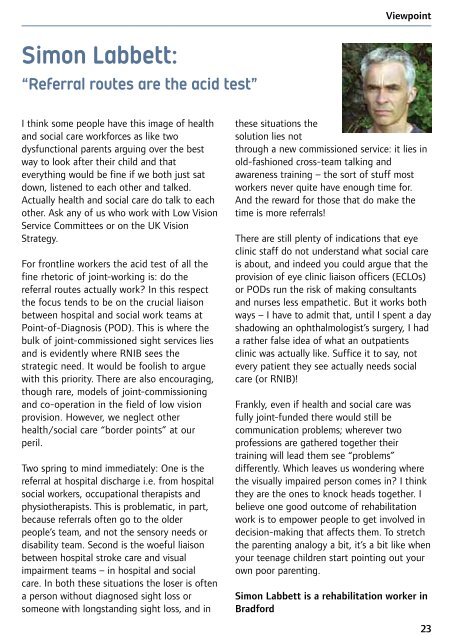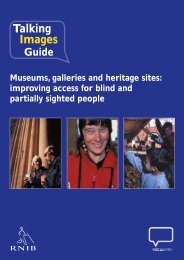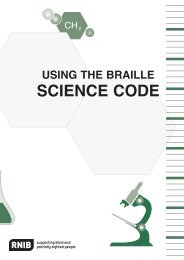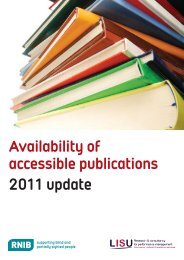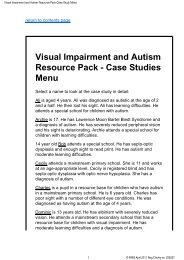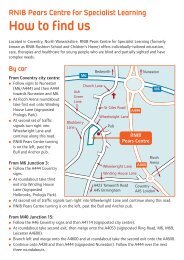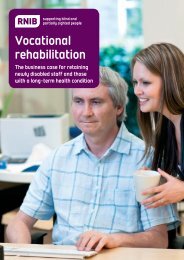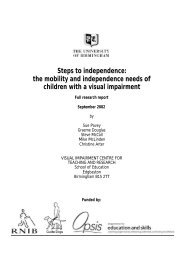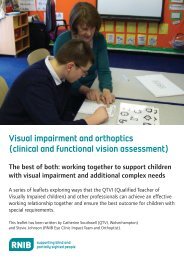Reflections on sight loss - RNIB
Reflections on sight loss - RNIB
Reflections on sight loss - RNIB
Create successful ePaper yourself
Turn your PDF publications into a flip-book with our unique Google optimized e-Paper software.
Viewpoint<br />
Sim<strong>on</strong> Labbett:<br />
“Referral routes are the acid test”<br />
I think some people have this image of health<br />
and social care workforces as like two<br />
dysfuncti<strong>on</strong>al parents arguing over the best<br />
way to look after their child and that<br />
everything would be fine if we both just sat<br />
down, listened to each other and talked.<br />
Actually health and social care do talk to each<br />
other. Ask any of us who work with Low Visi<strong>on</strong><br />
Service Committees or <strong>on</strong> the UK Visi<strong>on</strong><br />
Strategy.<br />
For fr<strong>on</strong>tline workers the acid test of all the<br />
fine rhetoric of joint-working is: do the<br />
referral routes actually work? In this respect<br />
the focus tends to be <strong>on</strong> the crucial liais<strong>on</strong><br />
between hospital and social work teams at<br />
Point-of-Diagnosis (POD). This is where the<br />
bulk of joint-commissi<strong>on</strong>ed <strong>sight</strong> services lies<br />
and is evidently where <strong>RNIB</strong> sees the<br />
strategic need. It would be foolish to argue<br />
with this priority. There are also encouraging,<br />
though rare, models of joint-commissi<strong>on</strong>ing<br />
and co-operati<strong>on</strong> in the field of low visi<strong>on</strong><br />
provisi<strong>on</strong>. However, we neglect other<br />
health/social care “border points” at our<br />
peril.<br />
Two spring to mind immediately: One is the<br />
referral at hospital discharge i.e. from hospital<br />
social workers, occupati<strong>on</strong>al therapists and<br />
physiotherapists. This is problematic, in part,<br />
because referrals often go to the older<br />
people’s team, and not the sensory needs or<br />
disability team. Sec<strong>on</strong>d is the woeful liais<strong>on</strong><br />
between hospital stroke care and visual<br />
impairment teams – in hospital and social<br />
care. In both these situati<strong>on</strong>s the loser is often<br />
a pers<strong>on</strong> without diagnosed <strong>sight</strong> <strong>loss</strong> or<br />
some<strong>on</strong>e with l<strong>on</strong>gstanding <strong>sight</strong> <strong>loss</strong>, and in<br />
these situati<strong>on</strong>s the<br />
soluti<strong>on</strong> lies not<br />
through a new commissi<strong>on</strong>ed service: it lies in<br />
old-fashi<strong>on</strong>ed cross-team talking and<br />
awareness training – the sort of stuff most<br />
workers never quite have enough time for.<br />
And the reward for those that do make the<br />
time is more referrals!<br />
There are still plenty of indicati<strong>on</strong>s that eye<br />
clinic staff do not understand what social care<br />
is about, and indeed you could argue that the<br />
provisi<strong>on</strong> of eye clinic liais<strong>on</strong> officers (ECLOs)<br />
or PODs run the risk of making c<strong>on</strong>sultants<br />
and nurses less empathetic. But it works both<br />
ways – I have to admit that, until I spent a day<br />
shadowing an ophthalmologist’s surgery, I had<br />
a rather false idea of what an outpatients<br />
clinic was actually like. Suffice it to say, not<br />
every patient they see actually needs social<br />
care (or <strong>RNIB</strong>)!<br />
Frankly, even if health and social care was<br />
fully joint-funded there would still be<br />
communicati<strong>on</strong> problems; wherever two<br />
professi<strong>on</strong>s are gathered together their<br />
training will lead them see “problems”<br />
differently. Which leaves us w<strong>on</strong>dering where<br />
the visually impaired pers<strong>on</strong> comes in? I think<br />
they are the <strong>on</strong>es to knock heads together. I<br />
believe <strong>on</strong>e good outcome of rehabilitati<strong>on</strong><br />
work is to empower people to get involved in<br />
decisi<strong>on</strong>-making that affects them. To stretch<br />
the parenting analogy a bit, it’s a bit like when<br />
your teenage children start pointing out your<br />
own poor parenting.<br />
Sim<strong>on</strong> Labbett is a rehabilitati<strong>on</strong> worker in<br />
Bradford<br />
23


